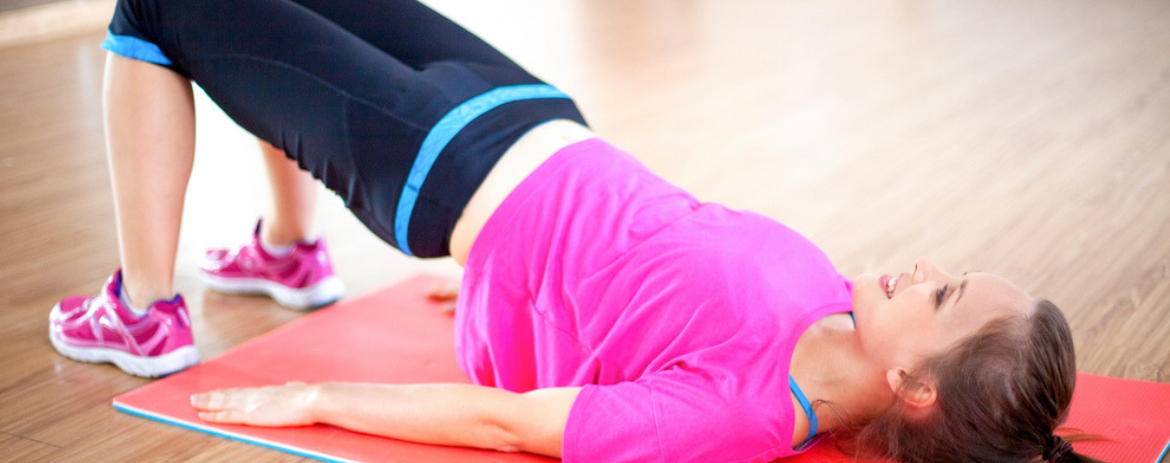Why you should be doing pelvic floor exercises
Posted: 18/03/2019

Let’s talk about pelvic floor exercises.
Any woman who has given birth has probably felt that sudden feeling of anxiety when they’re about to sneeze, cough, laugh or strain. Losing strength in your pelvic floor muscles gives a whole new, and way too literal, meaning to the phrase “wet yourself laughing”.
Some people don’t realise that pelvic floor muscle weakness can affect anyone, from women who’ve never been pregnant to men.
So, why does this happen to us and what can we do to stop it?
What are pelvic floor muscles?

Your pelvic floor muscles surround your pelvis and support all of your important organs “down there”; your womb, bladder and bowels.
Try tensing around your vaginal area, as if you were trying to hold in a wee. Feel that pressure? That’s your pelvic floor muscles getting to work. If you’re having trouble knowing what I mean, try stopping your urine mid-flow next time you’re on the loo. The muscles you clench to stop (or attempt to stop) are your pelvic floor muscles.
Don’t try doing pelvic floor muscles every time you’re using the loo, though. It’s not good for you and can cause a UTI (urinary tract infection), so only do them when your bladder is empty.
What causes weakened pelvic floor muscles?

The obvious answer? Vaginal birth and pregnancy. When you’re pregnant, your body starts making changes to prepare your body for giving birth vaginally. The muscles on your pelvic floor stretch in order to give way to a baby. If you give birth naturally, this stretches them even further, which can lead to weakened muscles postpartum. Forceps, large babies and tearing can often worsen this.
Straining when using the loo can also have an effect on your pelvic floor muscles. If you’re constipated (or maybe just hurrying a tad too much) and strain too hard, you are also in danger of prolapse. Our advice? Take your time and make sure your diet contains fibre for ease of, erm, “bowel evacuation”.
Heavy lifting can do damage down there, too. We love working out here at the Reynolds group, but it’s so important to not overdo it, as it can cause detriment if you’re not careful.
There are other reasons people might find their pelvic floor muscles getting weaker, such as age and weight, but the good news is there are exercises you can do to strengthen them!
Why should I exercise my pelvic floor muscles?
For a start, you won’t find yourself having to carry a spare change of undies around with you, or face an embarrassing mishap in public.
If you’re pregnant, it can also help with easing your baby out whilst minimising the chance of perineal tearing. It can even help your vagina to recover more quickly after giving birth.
How to practise pelvic floor exercises
The great thing about pelvic floor exercises? You can do them almost anywhere. Here are a few of our favourite.
The fake wee stopper
- Clench your pelvic floor muscles as if you were stopping a wee
- Keep pulling in towards your tummy
- Hold for four seconds
- Release slowly
- Repeat five times
Aim to do this exercise five times in a day. Keep increasing your hold time and reps to build muscle strength.
The quick squeeze
- Tighten and light your pelvic floor muscles in one big squeeze
- Hold for a couple of seconds
- Release slowly
- Repeat ten times
Aim to do this exercise five times in a day. Try to keep a consistent strength and speed.
The toe tap
- Lie on your back, with your knees bent and arms by your side
- Keeping your feet and arms flat on the floor, raise your pelvis towards the sky
- Pause
- Return to your starting position
- Repeat ten times
The wall sit
- Stand with your back against the wall and your knees at a 90 degree angle
- Hold for 60 seconds
Aim to do this exercise five times a day. If you struggle to hold for 60 seconds start with 30 and work your way up.
How can Reynolds help?

We’ve touched on a few, but there are so many different pelvic floor exercises that you can do both at the gym using weights and at home. Why not pop in to see us and ask one of our expert personal trainers for advice? We strongly believe that this subject is NOT taboo and will happily give you our honest and professional opinions.
Give us a call to get booked in or enquire after membership.



